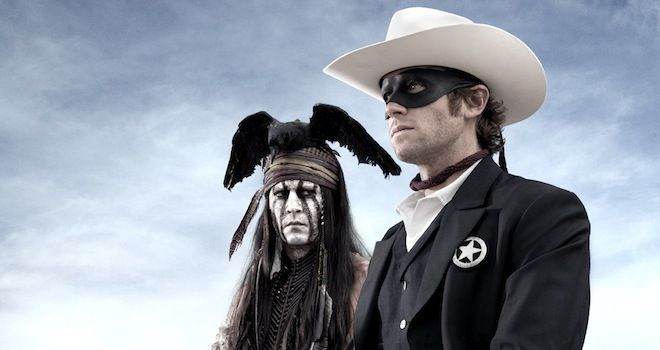‘The Lone Ranger’ Box-Office Flop: No Silver Lining For Disney, Depp And Bruckheimer, But Is Anyone Really Surprised?

Johnny Depp wearing a dead bird on his head wasn’t enough to prevent “The Lone Ranger” from riding off into the box-office sunset this holiday weekend.
The big-budget action western from Walt Disney Pictures (NYSE:DIS) took in a miserable $48.9 million, far behind the $142.1 million earned by Universal and Illumination Entertainment’s “Despicable Me 2.” Dave Hollis, Disney’s executive vice president of theatrical exhibition sales and distribution, told the Hollywood Reporter that the film’s dismal debut was disappointing, to say the least.
“Everything was perfect on paper, so today was incredibly frustrating,” he told the Hollywood Reporter.
Hollis’ frustration is understandable given the movie’s bloated $225 production budget, but was “The Lone Ranger” really so perfect on paper? For a moment, let’s overlook the fact that the western genre is probably the most challenged of 21st-century cinema. The Lone Ranger, in particular, is not even on the radar for the vast majority of today's moviegoing public. He and his trusty sidekick, Tonto, haven’t been a noteworthy part of American pop culture since the Eisenhower administration, when the “Lone Ranger” TV series gave the then-fledgling ABC network its first bona fide hit.
But that was more than a half-century ago. The last big-screen attempt to revive the masked man was 1981’s “The Legend of the Lone Ranger,” which, like this effort, flopped both critically and commercially. More recently, in 2003, there was a TV movie on the WB, which producers hoped would revitalize the franchise and spark a new series. It didn’t on either count.
So what made producer Jerry Bruckheimer and director Gore Verbinski think things would be different this time around? The answer, almost certainly, lies in the perceived star power of Johnny Depp, whose universally praised performance as Capt. Jack Sparrow in the “Pirates of the Caribbean” movies singlehandedly turned a throwaway theme-park ride into a multibillion-dollar franchise. Given that past success, it’s not all that surprising that Bruck and Co. thought lightning might strike twice, but one wonders how many times Hollywood has to learn the hard lesson about the declining value of movie stars.
As should be obvious to anyone remotely interested in box-office trends over the last two decades, today’s movie audiences need more than a big-name actor to entice them off of their couches and into the cinema, particularly during the crowded summer months. Already this summer we’ve seen lackluster box-office turnout for Will Smith, one of the biggest movie stars of the last decade, and Channing Tatum, one of the biggest movie stars of last year. Granted, star-powered vehicles can still fill seats for modest-budget fare, as Melissa McCarthy and Sandra Bullock’s “The Heat” proved last weekend. But the uncertainty principle around drawing potential makes it difficult to understand why producers would bank on a name to carry a summer tentpole.
That means the real bankability rests on the strength of the franchise, which makes the decision to greenlight “The Lone Ranger” that much more perplexing. Most franchise revivals, even bad ones, contain within them a certain level of fiscal soundness. “The Smurfs” movie, for instance, ostensibly appealed to nostalgic Gen-Xers who watched the cartoon in childhood and now have children of their own.
But how many young parents today remember anything about the Lone Ranger outside of Rossini's William Tell Overture? Grandparents, perhaps, may look back fondly on the nameless Texas ranger who fought injustice in the pioneering Old West, but it’s hard to imagine septuagenarian fans of the character gravitating toward Bruckheimer’s modern-day makeover. It was a similar story with 2011’s “The Green Hornet,” another radio-days relic whose reinvention (courtesy of Seth Rogen) failed to resonate with modern audiences.
It’s no secret that modern-day Hollywood subsists almost entirely on concepts with built-in audiences, but for producers looking to kick-start the next risk-free franchise, it’s worth asking who your movie is aimed at if you want to avoid shooting blanks.
Got a news tip? Send me an email. Follow me on Twitter: @christopherzara
© Copyright IBTimes 2024. All rights reserved.












